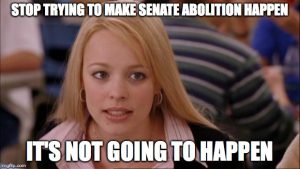The “Pathways Alliance” consortium of oil sands companies scrubbed their website as the bill that expands the Competition Bureau’s powers around investigating greenwashing gets royal assent, which seems to be suspiciously like a tell. I’m aware that they have been subject to particular legal claims around greenwashing, and when you add to that the parts in that Deloitte report that Alberta commissioned around the emissions cap, there was some specific language in there around the fact that carbon capture and storage is likely just an expensive money pit that won’t do much to lower emissions, it feels like Pathways is feeling the pressure, and that perhaps the oil and gas industry has reached its put-up-or-shut-up moment, that they can’t keep pretending that they can carry on as usual with the promise that CCS will come sooner than later, and we’ll have no more emissions problems (while the industry also makes up specific “cleanest” claims around oil and gas production, which also doesn’t stand up to scrutiny).
@CompBureau already had the power to investigate green claims as deceptive marketing. What's new is C-59 specifically targets greenwashing performance claims. These need to be supported by evidence consistent w/ recognized int'l standards. Cue the domestic industry hissy fit.
— Jennifer Quaid (@quaid_jennifer) June 20, 2024
This being said, I will acknowledge that Andrew Leach has some specific reservations around the legislation and the enforcement of all green claims, because some of the burden of proof, even with companies that are actually doing clean or green things. It’s an issue to keep in mind in any case.
It sounds easy: more emissions free power must have that effect, right? Maybe. But what will other suppliers do? What about changes in trade? And if it moves power prices, what is that impact. And the burden of proof, under the law, is on the person making the claim.
— Andrew Leach (@andrew_leach) June 20, 2024
If I'm @cdnoilsands, do I want to be the test case? Can the consortium of oil companies even agree on the meaning of each claim and how to prove it? And, given the burden is on them, it's fair to decide that the fight isn't worth it.
— Andrew Leach (@andrew_leach) June 20, 2024
Ukraine Dispatch
A Russian attack in Donetsk killed three and injured four, while overnight missile and drone attacks have damaged yet another thermal power plant. President Volodymyr Zelenskyy announced new plans to mitigate those attacks, and part of it is transitioning to greener sources of electricity .
https://twitter.com/ukraine_world/status/1803435004866826530
Fire breaks out at Russian oil refinery after drone strike, media reports.
A strike on the Ilya oil refinery in Krasnodar Krai reportedly caused a 50-square-meter fire at the attack site. Two people were injured, according to local police.https://t.co/LGnh0Mg0xo
— The Kyiv Independent (@KyivIndependent) June 21, 2024

